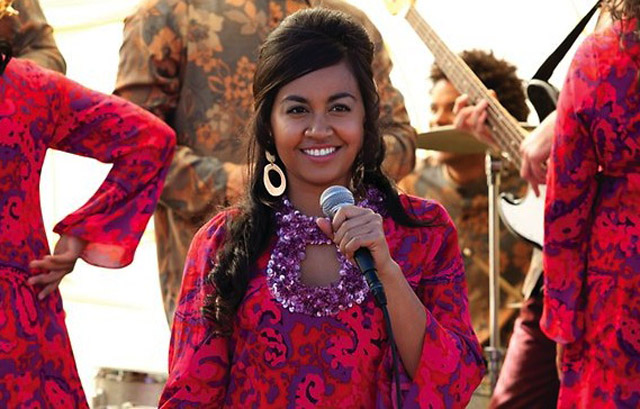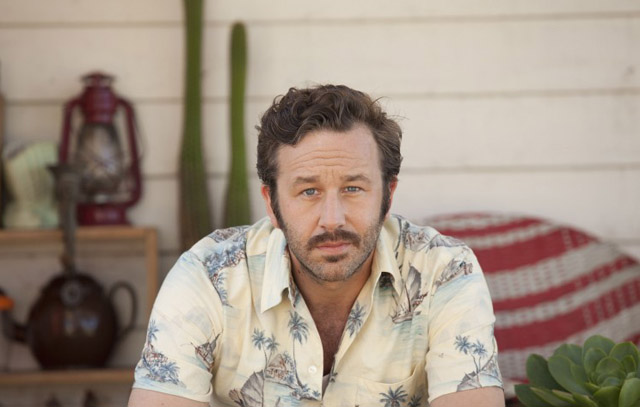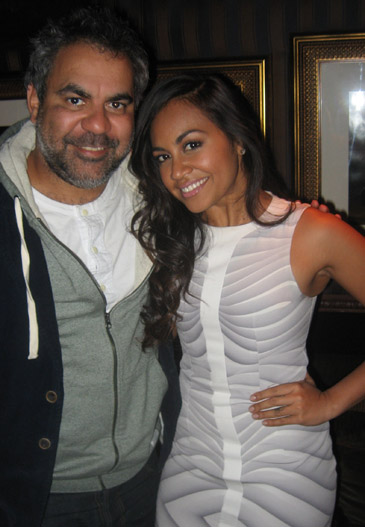CHICAGO – The Steppenwolf Theatre of Chicago continues to provide different viewpoints on the American stage, and their latest “Little Bear Ridge Road” is no exception. Featuring ensemble member Laurie Metcalf, it’s the resonate story of a family at the crossroads. For tickets/details, click LITTLE BEAR.
Interview: Director Wayne Blair, Jessica Mauboy of ‘The Sapphires’
CHICAGO – In other countries and cultures, there are parallel moments going on that are interesting mirrors to U.S. history. In “The Sapphires,” a girl group from Australia entertains the troops in Viet Nam, with many of the same U.S. issues of war, peace and social discord. The film is directed by Wayne Blair and features Jessica Mauboy.
Based on a true story, the film reflects on the practice in Australia of the “stolen generation,” when lighter skinned native Aborigines were stolen from their darker skinned families and assimilated into the white society. This is a thread in “The Sapphires,” as a stolen cousin rejoins the singing group before they go into Viet Nam. The film co-stars Chris O’Dowd (the cop in “Bridesmaids”), who is the manager of the group, and falls in love with one of the singers.
 Photo credit: The Weinstein Company |
The film also presents a couple of first timers. Director Wayne Blair is taking on his first feature film, and singer Jessica Mauboy is making her acting debut. Mauboy first came into prominence as a runner-up in 2006 on “Australian Idol” (the Idol counterpart in that country), and has since release two popular albums. Wayne Blair is also an actor, but had won an award for a short film at the Berlin Film Festival, and first came to the attention of the production team of “The Sapphires” when he performed in the stage version.
HollywoodChicago interviewed Wayne Blair and Jessica Mauboy during a promotional swing for their well-received film, which is making a limited U.S. debut in the next couple weeks, including Chicago on March 29th.
HollywoodChicago.com: Jessica, what was your journey to “The Sapphires”? What element of your connection or audition do you think got you the part of Julie?
Jessica Mauboy: I’d never heard of the story before, and it was Wayne that introduced me to the project. This was right after I released my second album after being on ‘Australian Idol’ in 2006, and I fell in love with the script. My career was building in the music industry at the time, but I felt I needed to be a part of the production. I wasn’t hand picked, but it was an opportunity to try acting, which I hadn’t done before, and make a focus and commitment to the story.
HollywoodChicago.com: Wayne, since this is your first feature film, what were the circumstances to your getting the gig, and what was the convincing point that you gave to producers once you were under consideration to direct?
Wayne Blair: I was an actor in the original stage version in 2005, and I was making short film and TV, and had won a Crystal Bear at the Berlin Film Festival for one of my shorts. The writer of the show, Tony Briggs, was a friend, and ask me if I wanted to direct the film. Tony co-wrote the screenplay, and eight years later – without knowing the full ramifications of what I had agreed to – it got serious. Being a first time feature filmmaker, having a $10 million dollar film that is set in the 1960s, with singing and choreography, it was heavy duty.
I had the confidence, and I wanted to do it, so I think a little bit of bullsh*t baffles the brain, and gets you through, and the end I made the film. When your confidence builds, you get better as an artist and storyteller overall, and it is a snowball effect. You have to have that confidence to make it work, but also have the confidence to be wrong, to have a shot at being wrong. Sometimes when you’re wrong, it’s better than being right ten times in a row.
HollywoodChicago.com: Jessica, so much of the film deals with the rejection of the native Aborigines in Australia during the 1960s, something that is not familiar to the rest of world. What amazes you about this non-acceptance in that era, and which story made the biggest impression on you regarding that time?
Mauboy: I was fortunate that my immediate family wasn’t involved in the ‘stolen generation,’ but I just recently found out that a distant cousin of my mother was stolen, and she found us. That was happening during my process with ‘The Sapphires,’ so we had a reunion and my mother was able to meet family she never knew she had. Being part of the film, and knowing the story, and then having that happen with my own family, completely stole my heart.
HollywoodChicago.com: Wayne, you had to convincingly recreate different locations and time periods in small town Australia, the outback and Viet Nam. What was the greatest challenge of making sure these locations and your time line lived up to the circumstances in the film?
Blair: It was very important, I had a great cinematographer and friend named Warwick Thornton, and we got some extra time from the producers to prepare the six week shoot. We had five different locations in those six weeks, the most exotic in Ho Chi Minh City. We had to be smart with our time there and be prepared. Pressure makes diamonds, and basically we worked our butts off. We just worked very hard, I hadn’t worked like that since or before in my life.
We stayed at the famous Rex Hotel in Viet Nam, which was made famous by war time journalists. We had our wrap party there after the arduous shoot, I had two drinks and slept for four days.
 Photo credit: The Weinstein Company |
HollywoodChicago.com: Jessica, given that you were born almost twenty years after the music you sing in the film was popular, how do these songs speak to you as a modern woman and singer?
Mauboy: I grew up with these songs, my mother was a big fan. We grew up singing in a church as well, so I had a gospel background. The music also was always a soundtrack, even as I was growing up in the 1990s. When I saw the song list that Wayne and the production team put together at the studio, I knew they were big songs to handle, and my concern was doing them well enough to respect the songs. Keep with the melody, and the tone, and not do too much to them. Wayne just told me to ‘sing it.’
HollywoodChicago.com: Wayne, the script had elements of racism, romance, war and show business all wrapped up in the film. Which of those elements fascinated you the most, and how did you communicate that fascination in the finished product?
Blair: That’s like ‘Sophie’s Choice,’ that question. [laughs] For me, as I sit here right now, it was the romance. Even though racism is a close second, I’m going to be controversial and say romance. A good love story in any film is something everyone can relate to, and one of the romances was between a far-flung Aborigine girl [Deborah Mailman] and an Irish ex-musician [Chris O’Dowd]. I was in the editing suite, and thinking, ‘…gee Chris and Deb, you’re making me cry.’ It was a lovely connection.
HollywoodChicago.com: Jessica, what is your greatest obstacle in your pursuit of show business, and how have you overcome that obstacle?
Mauboy: It was about being indigenous Australian, there was a time when there wasn’t too many of them climbing the music charts, in pop music. I wanted to overcome that, and show that it was possible to happen. That I could do it. It was through Idol that put me on that platform. I knew who I was, and what I had been through, and maybe I didn’t know as much about music as other people, but I felt it. I showed them I could do it, and I feel like I’ve succeeded.
HollywoodChicago.com: Wayne, dealing with the war elements of the story, especially given the controversial nature of the VietNam era and its ongoing ramifications in geopolitics, what did you want to make sure you did to honor the service of veterans in that war, but still show its affects and devastation?
 Photo credit: Patrick McDonald for HollywoodChicago.com |
Blair: My father was the first Aboriginal Sergeant Major in the Australian Army, and he did two tours of Viet Nam. I wanted to get that stuff correct, but at the same time I didn’t want a war film for the sake of a war film. You’re seeing the Viet Nam war through the eyes of these four Aboriginal girls, and that’s a point of view you’re never going to see again. [laughs] It was just trying to get it right through their eyes. And if we got it right there, we couldn’t get it wrong.
But having a father that was military, and had served, gave me the opportunity to ring him up and ask him about the shine on the boots, creases on shirts, and what he would do. He was the connection to that time in the war.
HollywoodChicago.com: Jessica, what was it like living in 1968 for a time? What was your favorite moment in reliving it?
Mauboy: It was actually about meeting the real Sapphires. We sat down and heard there stories, and saw the personalities come to life. I loved that they fought through a lot of difficulties with their humor. That is what amazed me about those woman in those times.
HollywoodChicago.com: Wayne, who are your director heroes, and do you honor them with a shot or secret moment in ‘The Sapphires’?
Blair: It’s Spike Lee and Steven Spielberg. It’s about the undercurrent of representing your own people like Spike did in his films. For Spielberg, it is the colors he and his cinematographer [Allen Daviau] used in ‘The Color Purple.’
HollywoodChicago.com: Finally, Jessica, in your short career so far, at what moment did you stop, look around, and wonder ‘how did I get here?’
Mauboy: It’s was the moment at Cannes, when the film was asked to play at the midnight screening, which I didn’t realize was such a big deal. We were there, and it was a moment of ‘this is what it’s like.’ We were escorted up the massive carpet into the theater, and afterward there was a long standing ovation. I felt like I was in another movie, very surreal, with all the cameras popping off.
HollywoodChicago.com: And finally for you Wayne, how do you define that element of culture in Australia that has produced so many great actors and performers over the last generation, what do you think is in the water of that culture?
Blair: Australia is so far away geographically, so as the adage says, ‘the sharpest axe is ground on the hardest stone.’ Since we’re so far away, we have to fight to be seen and heard, so we fight a little bit harder, or work a bit differently to be seen, and more importantly to be seen again and again. Now in Hollywood, there are the Hemworths, the Edgertons and of course Kate, Nicole and Naomi. Next are the indigenous actors and filmmakers, who are making a mark. And maybe at the forefront of that is these four girls in ‘The Sapphires.’
 | By PATRICK McDONALD |


